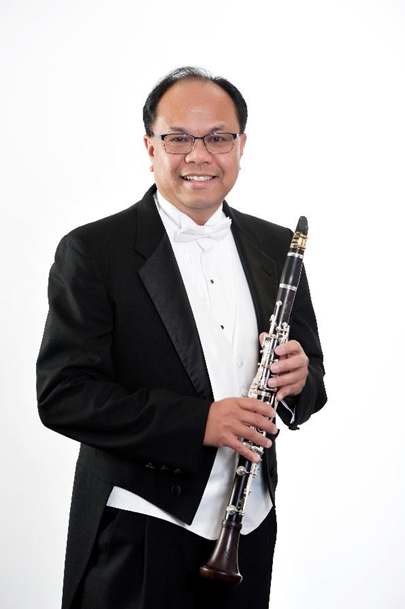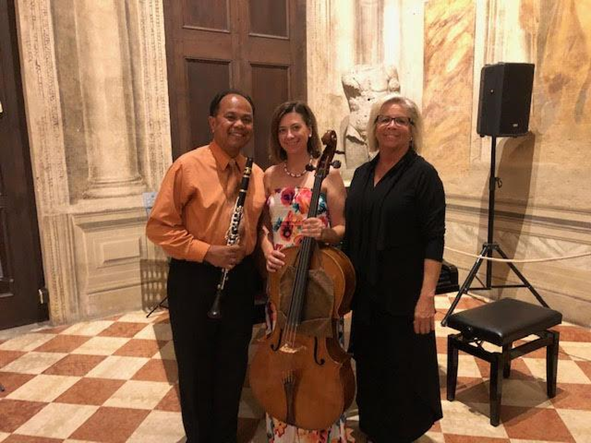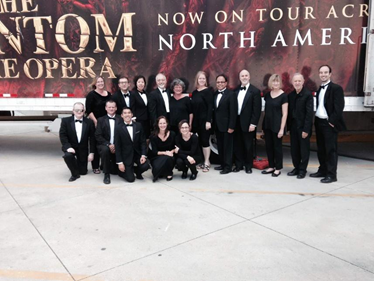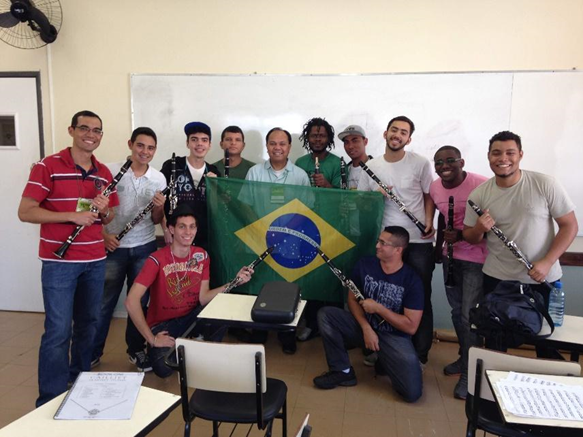Membership Spotlight: Clarence Padilla
by Melody Baker

Clarence Padilla
Clarence Padilla recently completed his 25th year as professor of music at Drake University in Des Moines, Iowa. He serves as the university’s primary clarinet studio instructor. Over his long and varied career, however, he has worn many other “musical hats.” I had the opportunity to sit down and speak with Prof. Padilla and explore his diverse musical career. We even discussed how his clarinet has taken him around the world! The following interview has been edited for clarity.
Melody (M): While serving as Drake’s Clarinet Professor, what other musical jobs or positions have you had?
Clarence (C): When I first came to Drake, the job was advertised as assistant professor of woodwinds. I was assigned to teach clarinet, saxophone, music education courses, and serve as assistant director of bands.
M: Wow, it sounds like you were the whole music department!
C: There were only five clarinetists when I got here, so they had to figure out a load, which also included marching band.
I started subbing with the Des Moines Symphony when I came here. Two years after I arrived, I won the second clarinet position in the Cedar Rapids Symphony. In 2000, I won the second clarinet position with Des Moines Symphony. So, I have been a contracted player since 2000 with the Des Moines Symphony. In 2010, I was hired as the personnel manager for the Des Moines Symphony.
I became chair of the Drake music department in 2004 and just stepped down from that position last July. It was supposed to be a three-year term, but it just morphed! Being a department chair is definitely the hardest job I have ever had. You are a middle manager, constantly working with administrators, faculty, staff and students—getting hit from beneath you, above you, sideways, etc.! Through it all, I learned a lot. One thing I learned is that people in the performing arts don’t always fit into the structure of academia. Performing artists are innately creative, interpretive and unstructured to some extent. But obviously, we are happy to do our jobs, and we feel fortunate to make a good living doing what we are passionate about. I consider myself very lucky to work with talented and dedicated colleagues at Drake.

Drake Trio 2018 (Ashley Sidon, cello; Cynthia Giunta, piano) – Verona, Italy
M: I remember you always saying how you tried to “lead from behind.”
C: That was my philosophy—to empower the faculty. I am not going to micromanage really intelligent and talented people. If they are great players and great teachers, I am not going to get in their way. That is what I am most proud of—the faculty at Drake generally got along with each other.
Besides these positions, I started conducting a group in the summer months, Music Under the Stars. It is a professional concert band made up of professional musicians, teachers, and advanced students. We have one rehearsal and one concert per week at the Iowa State Capitol. It is fun! I like to conduct, too. I like it when everyone just comes in ready to play.
M: Was this conducting position an unexpected position in which to find yourself?
C: Opportunities find you sometimes. Over the years I soloed with that group once in awhile or played in the clarinet section. After the previous conductor retired, they asked me to come in for one concert set. The next year they asked me to become the permanent conductor and musical director.
Everything you do prepares you for the next thing that you do. You draw upon all your experiences. Before I came to Iowa, I played in one of the most successful municipal bands in the country called the Long Beach Municipal Band. It is made up of studio players and professional orchestral players in Los Angeles. I was lucky enough to play with that group from the 1980’s. I actually kept going back every summer for the first six or seven years after I was hired at Drake. When I took over Music Under the Stars, I structured it the same way where we do a 45-minute set of traditional concert band music, marches, overtures, show tunes, movie themes, etc. Then we take a break and do a big band set with a vocalist. From my experience playing out in Disneyland, I also learned how they focused on the programming to enhance entertainment experience. So, I started themes for the concerts. I felt I could make the music experience very positive for the musicians and audience members.
M: Are you able to reach different audiences than the ones you typically encounter in concerts in the academic setting?
C: Yes, absolutely. The concerts are free, number one. You will get people who go to the symphony who have no idea what they are coming to. Music Under the Stars has been going on for 73 years, so you have people in their 60’s, 70’s, and 80’s who have attended since they were children. You get people who just live near the State Capitol and show up. They are riding their bikes and hear music and stop by. It is a pretty diverse audience. We do try to focus on the music, play at a high level, and be good stewards of music.
M: You are a doubler, even a tripler and beyond. What instruments besides the clarinet do you play?
C: It is hugely important to be really excellent on one instrument. Be as good as you can be on the clarinet. And when people hear you, make it sound like that is the only instrument you play, so that it sounds like you never have time to practice anything else. But, in today’s times, you have to be able to be more versatile. You have to learn all the instruments in the clarinet family. I also play all the saxophones. Being proficient on the saxophone has allowed me other valuable musical opportunities. I play in Drake’s Turner Center Jazz Orchestra. That has become hugely popular and we have a large following. We do six big band concerts a year in the Turner Center on the Drake campus. Playing saxophone has also allowed me to play a lot of the broadway national touring musicals that come into town. I just love playing in musicals because of the high level of professionalism.
M: Do you have a favorite musical you have played?
C: Wicked is my favorite. It is incredibly challenging and fulfilling music. I never got tired of playing that show. It was a three-hour show that would just fly by. It is so appealing to everybody. I played it over 80 times, and I have only seen it once. It has been through Des Moines three times.

Phantom of the Opera – National Tour (Des Moines Civic Center)
M: Could you have predicted the musical career path you have taken?
C: Oh boy! Number one, I always tell people that I have the best job in the world. I am so lucky to do what I do, and I will never forget it. I run into a lot of people who don’t like what they do. I am really lucky that I teach at a reputable institution such as Drake University, play in one of the best regional orchestras in the Midwest, and live in a city that promotes culture and the performing arts. I am really lucky.
When you are in school, you do not really know what it is you are going to do. During the spring of 1993, before the internet, graduate students always went to this one bulletin board at the University of Southern California to see what kind of jobs were out there. That particular year, I applied for all three positions for which I thought I was qualified. Drake was the only one that called me back. I am lucky.
You have to be open to different opportunities. You do not want to say “no” too soon or too quickly. You want to set very high expectations of yourself, but sometimes it takes steps to get there. I would not have imagined myself in Des Moines, but I am very glad to be here.
M: So, how important would you say it is for clarinetists to have secondary musical interests outside of performing and teaching?
C: Huge. Be great, really great at one thing. If that is playing your clarinet or teaching, be really great at that. Then be very good at one or two other things. There are very few positions like mine anymore where all you do is teach the clarinet. Now you have to wear several hats and you have to be good at different things. But, be darn good at playing the clarinet and teaching the clarinet. If you are good at five things, but not excellent at one, you are not going to get anywhere.
M: What are some highlights of your international teaching experiences?
C: I have had some wonderful times. I have been to China three times. I have taught in Ecuador and Brazil. Even if we do not speak the same native language, music is the universal way to communicate. I have worked with young clarinet players all over the world, and we can still communicate even though we do not speak the same language. I will work with anybody as long as they are eager to learn!

Brazil 2014 – 25th Festival de Musica Colonial e Musica Antiga da Pro-Musica in Juiz de Fora, Brazil
M: How do you communicate during these lessons?
C: I will conduct a lot. When I am talking about breathing, that is easy to model. I model a lot in those types of lessons. I will also model what it is I think they are doing incorrectly. That is a wonderful way to teach, both what is right and what needs to be corrected. It is also a good way to make them laugh, or to break down the barriers.
M: Do you have a favorite site you were able to see while teaching internationally?
C: The Great Wall—standing there and thinking to myself, “It was my clarinet that brought me here. And it didn’t cost me a dime!” Tiananmen Square is another one, and standing under the Eiffel Tower.

Tiananmen Square – Beijing, China. Drake and Minzu Music Students
M: Why is it important for you to be a member of the ICA?
C: It is important that we share knowledge with each other. If we are going to sustain musicianship, and specifically clarinet, teaching and playing, we have to share knowledge. And we have to share experiences with each other. There is no reason in the world I have to keep everything I know in my head. I want people to know how much I enjoy what I do. I have such joy.
Quickfire Questions
M: If you had to compare the clarinet sound you strive to achieve to something tangible, what would it be?
C: Chocolate. Burgundy velvet. If it was food, Italian. You can use all different ingredients and it is always good.
M: You have a lot of inspirational quotes and sayings hanging in your studio. Do you have a favorite one?
C: I like Muhammed Ali’s quote, “It ain’t showin’ off if you can do it.” I see it every day. Clarinet players are always a little on the shy side. I tell students that I am generally a shy person. But when I play and perform, I try to be an extrovert. It is OK to be an extrovert when you play music.
M: What is one standard piece of clarinet repertoire that never gets old for you to perform?
C: The Copland Concerto. That is my favorite solo clarinet piece. It is so appealing to listen to. It is so gratifying to play and to study. That piece, to me, has everything in it, everything you would want to be able to do. It is all there. That always leads me back to the story of when I played it for Mitchell Lurie. He walked over to his file cabinet and took out a picture of himself and a conductor. He asked if I knew who it was conducting in the photo and I said, “well, that is Copland!” I feel so good about that piece. Lurie played it with Copland, and then I studied it with Lurie. I always tell my students, “now you are studying it with me. So, it goes Copland, Lurie, me, and then you.”
Comments are closed.